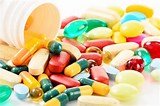Dietary Supplements for Depression: Risks and Potential Benefits
By Nicole Mori, RN, MSN, APRN-BC, Research Advanced Practice Nurse
The use of dietary supplements or vitamins for the treatment of depressive symptoms is increasingly common among patients. Factors driving this trend include unsatisfactory response with standard treatments, adverse drug events, skepticism about psychiatric medications and the perception of dietary supplements as “natural” and safe.
Although evidence increasingly supports the relationship between quality of diet and mood, more research is needed to clarify the role of dietary supplements in the management of depression. Consumers often take supplements based on inconclusive data from small, methodologically-flawed studies. Unlike FDA-approved drugs, supplements do not have to demonstrate unequivocal evidence for efficacy or safety. Adulteration, contamination, variations in potency, and product instability are not uncommon. When treating depressed patients, it is important to ask about use of dietary supplements and to be ready to offer guidance regarding the evidence for potential benefits, possible risks and drug-supplement interactions. The following are commonly-used supplements with a potential effect on depressive symptoms.
Omega 3 polyunsaturated fatty acids: Eicosapentanoic acid (EPA) and Docosahexaenoic acid (DHA)
Omega 3 fatty acids are long chain lipids found in oily fish. High dietary intake has been associated with low rates of depression. Omega 3 fatty acids enhance neurotransmission, neurogenesis and reduce inflammation. There is support for supplementation in Major depression with several meta-analyses showing efficacy. There is some evidence for efficacy of omega 3 fatty acids for bipolar depression. Over the counter products vary greatly in composition and EPA/DHA ratio. Evidence supports the use of EPA-dominant formulations. Adverse events and drug interactions are uncommon, but risk for excessive bleeding must be considered. Dose 1-2g of EPA/day.
Folic acid and Methylfolate
Involved in dopamine, serotonin and norepinephrine synthesis. Folate deficiency has been associated with increased risk for depression. Evidence supports adjunctive use of methylfolate with antidepressants for the reduction of Major depression symptoms. An FDA approved formulation of l-methylfolate available by prescription has shown efficacy at the 15mg/d dose level. Evidence for the efficacy of folic acid and Depression is mixed and there is no evidence supporting the use of either folate or methylfolate in Bipolar depression. Methylfolate is usually well-tolerated, although there are concerns about use masking B12 deficiency and historical concerns about cancer. Routine folate supplementation >1g/d is not recommended. l-methylfolate dosage is 7.5-30mg/day, maximum 1g/day (folate).
S-adenosylmethionine (SAMe)
An endogenous aminoacid involved in neurotransmitter synthesis. Decreased serum and CSF levels are associated with depression. A few studies support efficacy for supplementation in Major depression but more research is needed. There is no data to support use of SAMe in bipolar depression. Adverse events include nausea and anxiety. May interact with serotonergic antidepressants and increase risk for manic and hypomanic episodes in Bipolar disorder. Dose 200-800 twice/day.
Vitamin D
Low serum concentrations have been associated with depression. Vitamin D acts as a receptor ligand in the prefrontal cortex and hypothalamus. Some evidence supports supplementation for reducing symptoms in clinically-depressed patients but further research is needed. Evidence does not support supplementation as a therapy for bipolar depression. Caution regarding risk for hypercalcemia and toxicity with excessive intake. Dosing varies.
N-acetylcysteine (NAC)
Available as a nutritional supplement and as prescription medication for treating acetaminophen overdose. NAC has antioxidant and anti-inflammatory properties and modulates the glutamate pathway. Some evidence for reduction in bipolar depression symptoms. Not effective in Major depression. Gastrointestinal upset may occur. Dosing 1-1.5g twice/day.
St. John’s Wort
A perennial herb containing active compound hypericin, which inhibits reuptake of dopamine, norepinephrine and serotonin. Some support for short-term efficacy in depressive symptoms, but more long term and safety data is needed. Significant risk for drug interactions due to interaction with serotonergic drugs (serotonin syndrome) and interference in the metabolism of hundreds of drugs by induction of Cytochrome P450 enzymes make this an undesirable adjunctive option. Dosing varies due to variability in potency.
Probiotics
Alterations in intestinal flora have been implicated in mood disorders, although the mechanism is unclear. Probiotic supplements are thought to impart a health benefit by optimizing intestinal flora and are used to manage gastrointestinal symptoms. Animal studies show blunting in inflammatory response and improvement in mood symptoms with supplementation, but few clinical trials yielded positive results. Products on the market vary in terms of bacterial strain content, stability and bioavailability. Adverse events are rare, except for opportunistic infection immunocompromised individuals. Dosing varies.
There isn’t a one size fits all or best supplement for depression. There are some benefits to adding in supplements for depression symptoms and in other areas more research is needed. Be sure to work with a medical professional and consider the potential benefits, possible risks and any drug-supplement interactions for medications you may already be taking.
If you are seeking help for your depressive symptoms, contact us at the Lindner Center of HOPE. There is HOPE.
References
Sarris J, Murphy J, Mischoulon D, et al. Adjunctive Nutraceuticals for Depression: A Systematic Review and Meta-Analyses. Am J Psychiatry. 2016;173(6):575-87. Nahas, R., & Sheikh, O. (2011).
Complementary and alternative medicine for the treatment of major depressive disorder. Canadian Family Physician, 57(6), 659–663.
Sarris J. Clinical use of nutraceuticals in the adjunctive treatment of depression in mood disorders. Australas Psychiatry. 2017;:1039856216689533.
Rakofsky JJ, Dunlop BW. Review of nutritional supplements for the treatment of bipolar depression. Depress Anxiety. 2014;31(5):379-90.
